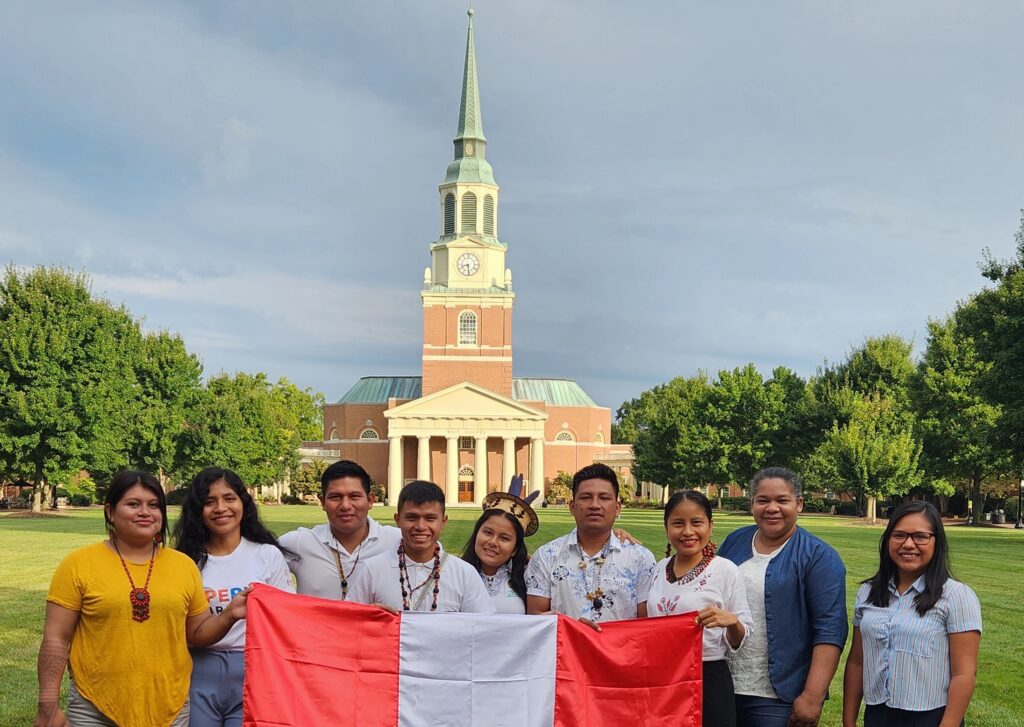Welcoming the Next Generation of Peru’s Indigenous Leaders
Connecting Cultures Returns to WFU
On Monday, September 9, the Sabin Center will welcome a delegation of young Amazonian leaders to Wake Forest to kick off the second year of our “Connecting Cultures” program. This groundbreaking initiative, which also brings our guests to the University of Richmond and to Washington D.C., is a collaborative effort between the Sabin Center, CINCIA, and the US Department of State.
A Program with Purpose
Connecting Cultures is designed to advance three core objectives. First, to strengthen and support Peru’s young Amazonian leaders seeking to protect their communities and the natural environments upon which they rely, and which they have responsibly stewarded for millennia. The program aims to equip the delegation with the knowledge, skills, and resources to address the growing threats of environmental crimes unfolding in their regions. Second, to build an international network of support for these leaders and their partners. By fostering connections between Indigenous communities and key partners and leaders within the United States, we are creating a global network of allies committed to environmental protection and human rights in the Peruvian Amazon. Third, to promote participation of Indigenous youth. By actively supporting the involvement of Indigenous youth in the management of their natural resources and protection of their communities, we are investing in a sustainable future for future generations.

High Impact Agenda
Nine young Indigenous leaders from eight different nations in the Peruvian Amazon will participate in this year’s event, featuring programming developed to explore the topics they’ve identified as most critical to their communities, like conservation, education, food resilience, and sustainable economic opportunities.
While here, the delegation will meet with the University’s President and Provost, engage with students in Wake’s Latin American and Latino Studies and Environmental Studies programs, as well as the Law School’s Environmental Law and Policy Clinic, and be trained in the use of advanced technologies like remote sensing and artificial intelligence to help them safeguard their territories. They’ll wrap up their visit with a Pilot Mountain research outing led by Sabin Center Founding Director Miles Silman.
The delegation will then travel to the University of Richmond, where they’ll continue to engage with students in recreational and local environmental restoration activities, receive additional training on climate and threats mapping from the university’s Spatial Analysis Lab, and will meet with a local indigenous and NGO leaders.
Finally, they’ll head to Washington D.C. for meetings with leaders at NASA, The Department of the Interior, the State Department, and the Peruvian Embassy. They’ll also enjoy visiting some signature DC venues like the Smithsonian Museum of the American Indian and the National Air & Space Museum.
Thank You to Our Partners
We are grateful for all the partners in Peru and the United States who are helping to make this year’s Connecting Cultures program a success. We would like to thank Professor David Salisbury from the University of Richmond for the thoughtful programming and hospitality he is extending to the delegation. We would also like to thank Professor Victor Hernández-Huerta, Dr. Julie Velásquez-Runk, Dr. Paúl Pauca, and Dr. Liz Gandolfo of the college as well as John Knox, Scott Schang, and Miles Malbrough of the law school for the expertise and generosity they are bringing to this year’s programming.

